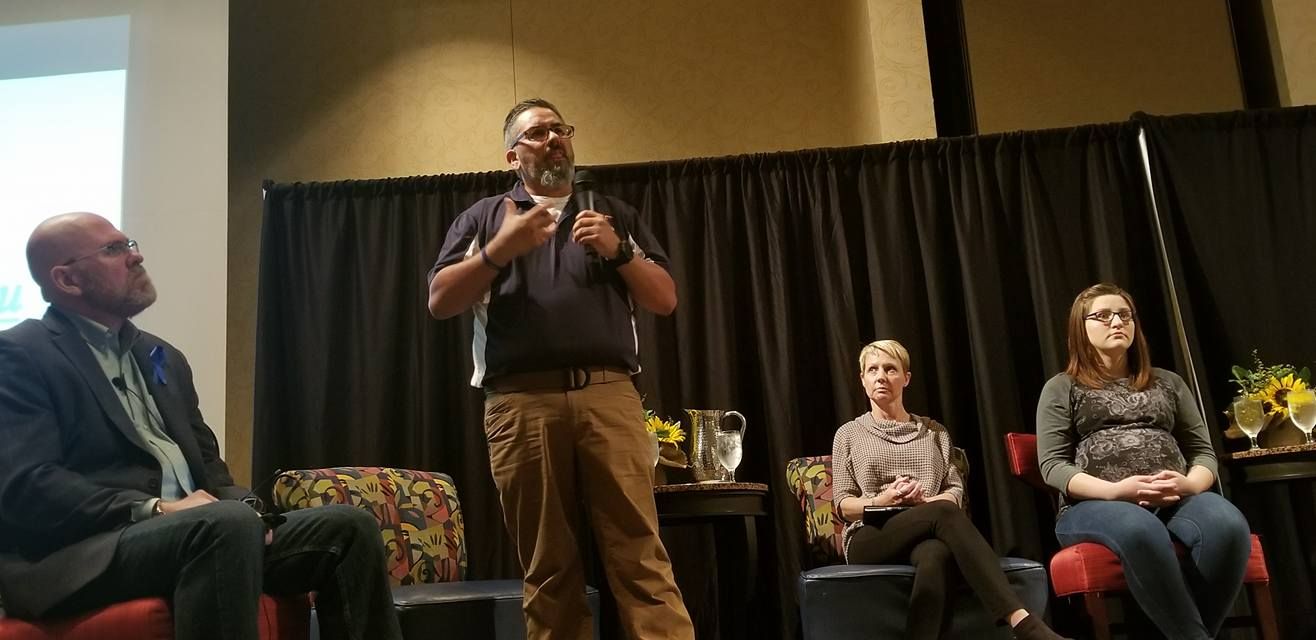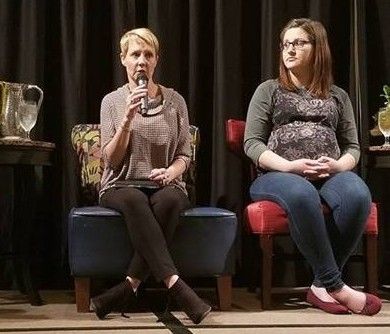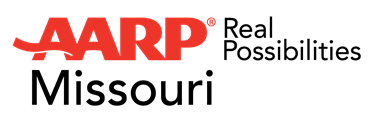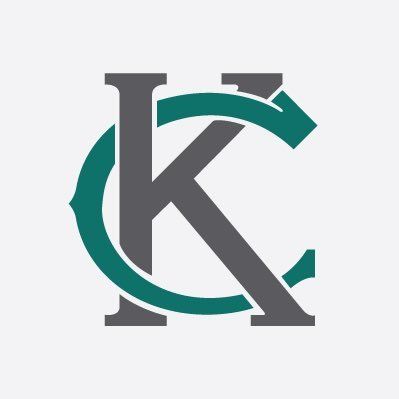If you want to be in the know about what’s going on at our organization, you’ve come to the right place.
Be sure to check back regularly to get our latest news updates.
AMERICUS, Ga. (WALB) - Loved ones of military members and veterans now have new ways to learn to take care of themselves.
The Rosalynn Carter Institute (RCI) for Caregiving in Americus announced three new partnerships with organizations to help military caregivers.
AMERICUS, GEORGIA – At a time when many Americans are feeling isolated and disconnected, the Rosalynn Carter Institute is proud to partner with Caregivers on the Homefront, RallyPoint, and the American Red Cross Military and Veteran Caregiver Network (MVCN) to expand outreach to caregivers. Through these three exciting partnerships, RCI will provide virtual programming and tools to empower caregivers who support service members and veterans across the United States and around the world.
When things are busy, wellness often takes a backseat to our presumed priorities. Check out a few ways to bring your personal health back to the forefront of your life.
Meditation is powerful. If you’re still unsure whether or not the practice is worth trying, check out these top benefits of meditation and consider how they can help improve your life.
The shortage of caregivers around the country has opened a constructive path for men seeking work, including some who have served time in prison.
More than 40 million adults in the United States are unpaid caregivers. They need our help managing the ups and downs of caring for loved ones.
The Elizabeth Dole Foundation, AARP, and Hiring Our Heroes have collaborated to create an important guide for employers, Supporting Military and Veteran Caregivers in the Workplace: A Practical Guide for Employers.
Hidden Heroes, a 2014 RAND study on America’s Military Caregivers, found that there are nearly 5.5 million military caregivers in the United States. Of these, 19.6 percent (1.1 million) are caring for someone who served in the military after the terrorist attacks of September 11, 2001. Military caregivers sacrifice greatly to care for their loved one. They suffer from worse health, employment difficulties, depression, deteriorating family relationships, and financial challenges.
This guide provides employers of military and veteran caregivers information on how they can better support them. It includes a case study on balancing work and caregiving, and information on how to create a caregiver-friendly workplace.
Less than one in 10 family caregivers receive training for assisting older adults with disabilities, a U.S. study suggests.
Nearly 18 million family caregivers provide help with daily tasks and manage medical needs for older Americans with disabilities, researchers note in JAMA Internal Medicine. An emerging body of research suggests that education and training can benefit these caregivers and their care recipients, but little is known about what factors might influence whether caregivers receive any training.
A few days after a terrific surgeon removed part of my husband’s lung, the hospital discharged him. That evening at home, my husband began gasping. My blood ran cold when he told me that he thought he was suffocating.
SMITHVILLE — The Elizabeth Dole Foundation’s 2019 class of Dole Caregiver Fellows includes Rachel Moyers of Smithville, who will help represent Missouri from 2019 to 2021.
WASHINGTON — Secretary of Veterans Affairs Robert Wilkie commended the Veterans’ Family, Caregiver and Survivor Federal Advisory Committee on March 27 for recommendations that will assist in the department meeting its commitment to improve the experiences of all those it serves.
WASHINGTON — The U.S. Department of Veterans Affairs (VA) and the Department of Health and Human Services’ Substance Abuse and Mental Health Services Administration (SAMHSA) convened seven teams March 27-29 in Arlington, Virginia, for the Mayor’s Challenge to Prevent Suicide Among Service Members, Veterans and their Families.
As federal agencies and appropriators face a tough year of budget standoffs in the coming months, the Department of Veterans Affairs is preparing for its own funding battle.
I’ve read countless articles, many on The Mighty, about the struggle of having an invisible illness and the way other people judge the “validity” of people’s conditions. I’ve also read about people who aren’t taken seriously when they express their most intimate, dark thoughts to family, professionals and friends.
We’ve gotten too used to discussing suicide as a fleeting, temporary side effect of mental illness. We might better serve people in need if we could acknowledge the messier reality.
If American employers embraced the recommendations of a new Harvard Business School report, life could be a lot easier for workers who are also unpaid caregivers. And the companies’ bottom lines would benefit as well.
“The best chance for a wounded warrior to recover and thrive is having a strong, well-supported caregiver” – 2014 RAND Report
The Veterans Health Administration (VHA) is the largest integrated healthcare system in the country, serving more than nine million enrolled veterans annually and VHA healthcare providers are committed to the highest quality of care for our veterans. According to recent surveys, over 25% of VHA enrollees reported needing the support of a caregiver. These caregivers, the spouses, parents, family members and friends of veterans take on a variety of tasks including bathing, feeding, dressing, managing medical appointments, monitoring for emotional triggers, and more. They must also often manage households and take on the role of primary breadwinner.
Caregivers come from all walks of life. Whether you are a paid professional, trained volunteer or a valued friend or family member, you may be charged with the care of another individual. Caring for another person is not an easy task and may be doubly harder when caregiving is a part of other responsibilities.
Lindsay Jurist-Rosner had a secret. One she’d kept since she was a kid.
Her mother had multiple sclerosis, and Jurist-Rosner was her on-again, off-again caregiver.
“It took on many different forms over the years,” said Jurist-Rosner, now 38.
As she grew up, Jurist-Rosner’s role intensified from helping around the house to making sure her mom was up, dressed, and fed in the morning—all before rushing to her full-time job in marketing.
“It remains the single hardest, loneliest, stressful thing I’ve done in my life,” she said.
Researchers studied 28 middle school and high school students 12 to 19 years old who are youth caregivers for sick family members. The study is the first of its kind to take a comprehensive look at this population.
NASHVILLE, Tenn. and NEW YORK, Oct. 31, 2018 /PRNewswire/ -- As the nation begins celebrating National Caregiver's Month in November, Morgan James's new release, 7 Caregiver Landmines: And How You Can Avoid Them by Peter W. Rosenberger, equips family caregivers to live a healthier, calmer, and even more joyful life while serving as a caregiver.
While employers and recruiters may initially hesitate to hire a return-to-work caregiver, they may want to reconsider. Candidates who have been out of the workforce raising children, providing holistic care for a disabled or chronically ill family member, or occupied in other ways as a caregiver accrue a plethora of skills and character-building traits that serve businesses well.
Regular exercise helps reduce the stress of family members who are caring for relatives with Alzheimer’s or other dementia and may also help improve the caregivers’ long-term health, according to a small study published online recently in the journal Psychoneuroendocrinology.
Caregiving can be physically and emotionally exhausting. Whether you are in the profession of caregiving or taking care of a loved one, it is important to remember to recharge your batteries. For family members, caregiving can also lead to additional pressures, such as financial strain, family conflict, and social withdrawal. Over time, caregiver stress can lead to burnout, a condition marked by irritability, fatigue, problems with sleep, weight gain, feelings of helplessness or hopelessness, and social isolation.
Executive Director of Caregivers on the Homefront, Shawn Moore, advocates for veteran caregivers at the KCVA Mental Health Summit on September 12th, 2018.
New Center dedicated to Veteran and Caregiver research named for Senator Elizabeth Dole
Washington, D.C. – September 7, 2018:The Elizabeth Dole Foundation celebrated a milestone accomplishment for military and veteran caregivers today with the Department of Veterans Affairs’ announcement that the VA will fund the first National Center of Excellence for improving veteran and caregiver services. Senator Elizabeth Dole has called for the creation of such a Center since first unveiling the crisis facing veteran caregivers. The Foundation applauds Secretary of Veterans Affairs Robert Wilkie and the VA Health Services Research and Development (HSR&D;) service for responding to the Senator’s call. The new center will be named for Senator Dole in recognition of her national leadership and advocacy on behalf of caregivers. The Elizabeth Dole Center of Excellence will expand the capacity of the VA to deliver innovative, data-driven, and integrated approaches to improve services for veterans and their caregivers.
"'He's my children's father' says a divorced woman, explaining why she is helping care for her ill ex-husband...Chad Burnheimer and Holly Platt, both in their 40s, had been divorced for eight years when he was diagnosed with brain cancer. At that point, Ms. Platt became his caregiver, taking him to the doctor, monitoring his medicine and joining him at support groups. As families in the U.S. become smaller and more far-flung, new caregivers emerge, including ex-spouses."
"Still, there is one trend-borne of a gradual shift in public perception but grounded in economics-that underscores the potential leverage of family caregivers: the rise in multigenerational households. According to a 2016 Pew Research survey, one fifth of U.S. households are now multigenerational. Many of these households include an elder being cared for by children and grandchildren, signaling a shift from the way families handle long-term and end-of-life care."
"But one proposal - the Family and Medical Insurance Leave (FAMILY) Act - would be a major step forward. It would create a new office within the Social Security Administration to run a paid leave program funded by a new payroll tax. It would cover all family-related caregiving for up to 12 weeks, so almost all workers contributing to the program could eventually benefit from it. Today, more than 43 million Americans provide unpaid caregiving - often to the detriment of their household finances."
Caregivers on the Home front Inc. Founder, Shawn Moore, speaks out about the leadership of the VA.
This week I wanted to share some of my most favorite things like other blogs, websites, posts, articles, essays that have moved me or really stuck with me in some way after reading them. I try to visit a caregiver webpage (and support group page) every day, and some days what I find is what I focus on for a few days. Maybe I need to process the information or maybe I need to read it at a later time, but no matter what I come across I feel a connection with the piece, the story, the author…you get the idea.
5.5 mil strong. #HiddenHeroes caring for vets--meet daughter & Mom giving all. #NationalFamilyCaregiversMonth @DoleFoundation #givingtuesday...read more.
KANSAS CITY, Mo. — Shawn Moore will never forget the call that changed her life....read more.
PR Web (National Alliance for Caregiving) | August 31, 2017
"To study the impact of rare disease on family caregivers, the National Alliance for Caregiving, in partnership with rare disease patient advocacy organization, Global Genes, is launching a "first-of-its-kind" national snapshot of rare disease caregivers. This fall, the two groups plan to release a national survey aimed at collecting feedback from over 1,000 family caregivers of children and adults with rare diseases."
Reuters | August 25, 2017 “The average lifetime cost of care after a diagnosis of dementia in the U.S. is about $322,000, and families pay about 70% of that, new research suggests. The cost of care is $185,000 higher for someone with dementia than for someone without it, the study authors wrote in the Journal of the American Geriatrics Society, online August 17.” Read more
How HIPAA regulations can encourage caregiver, family engagement Patient EngagementHIT | August 28, 2017 “Being a patient does not have to be a solo experience. Many patients benefit from caregiver and family engagement – and many providers encourage collaborative decision-making. While HIPAA regulations exist to secure the rights of patients to keep their health information private, the law can also enable approved personal representatives to help individuals receive the best possible care.”
Robo-caregiving & why you might delegate your loved ones to a robot Big Think | August 28, 2017 “Robotics is already changing how we live, shop, invest, travel, and soon, robo-caregivers will transform how we provide care. Advances in artificial intelligence will deliver extraordinarily innovative services in support of our loved ones. However, the use of robots to care for our children, elderly and disabled will also give rise to some very human questions.”
Burdens of spousal caregiving alleviated by appreciation, study finds Science Daily | August 28, 2017 “When discussing spousal care, the draining demands of caregiving and the uplifting effects of helping stand in apparent contrast to one another. But recent research shows that the time caregivers spend actively helping a loved one can improve the caregiver’s sense of well-being — and now, Poulin, an expert in empathy, human generosity and stress, is part of a research team that has published a study exploring why that’s the Continue reading →
Getty Images ... Palliative care can improve patient satisfaction, cut health care costs and even extend life for seriously ill patients. ... En español | Realizing that seriously ill patients ofte...
Getty Images ... Palliative care can improve patient satisfaction, cut health care costs and even extend life for seriously ill patients. ... En español | Realizing that seriously ill patients ofte...
Find answers to questions about long-term care insurance and veteran's and other public benefits ... AARP, November 2, 2016 | ... En español | Find answers to your questions about long-term care in...
Find answers to questions about long-term care insurance and veteran's and other public benefits ... AARP, November 2, 2016 | Comments: 0 ... En español | Find answers to your questions about long-...
November 2, 2016 | ... En español | Get answers to financial and legal questions that you may encounter as a caregiver - from powers of attorney to healthcare advance directives, and more. ... Legal
November 2, 2016 | Comments: 0 ... En español | Get answers to financial and legal questions that you may encounter as a caregiver - from powers of attorney to healthcare advance directives, and more.
November 2, 2016 | ... En español | Check out these resources for help in choosing the right housing and care solution for your loved ones – whether at home or in a facility. ... Housing Options .....
November 2, 2016 | Comments: 0 ... En español | Check out these resources for help in choosing the right housing and care solution for your loved ones – whether at home or in a facility. ... Housin...
En español | Let AARP's Caregiving Question and Answer Tool provide you with fast access to the answers you are looking for about caregiving. ... Choose a topic below and click "See all questions" ...
How do I apply for Social Security disability for another person? ... October 24, 2016 | Comments: 0 ... En español | Social Security pays benefits to people under full retirement age who cannot wo...
VA Eastern Kansas Suicide Prevention Summit April 13, 2018
April 13, 2018
The VA Eastern Kansas Suicide Prevention Summit was held this weekend at the Courtyard by Marriott in Junction City, KS. Beyond Thank You "A community conversation about military transitions, suicide prevention, healing, and hope."
Shawn Moore and Dr. Rachel Moyers PHD attended the summit and were able to share their experiences with suicide in the family. They were also able to shine a large spotlight on the mission of Caregivers on the Homefront.








